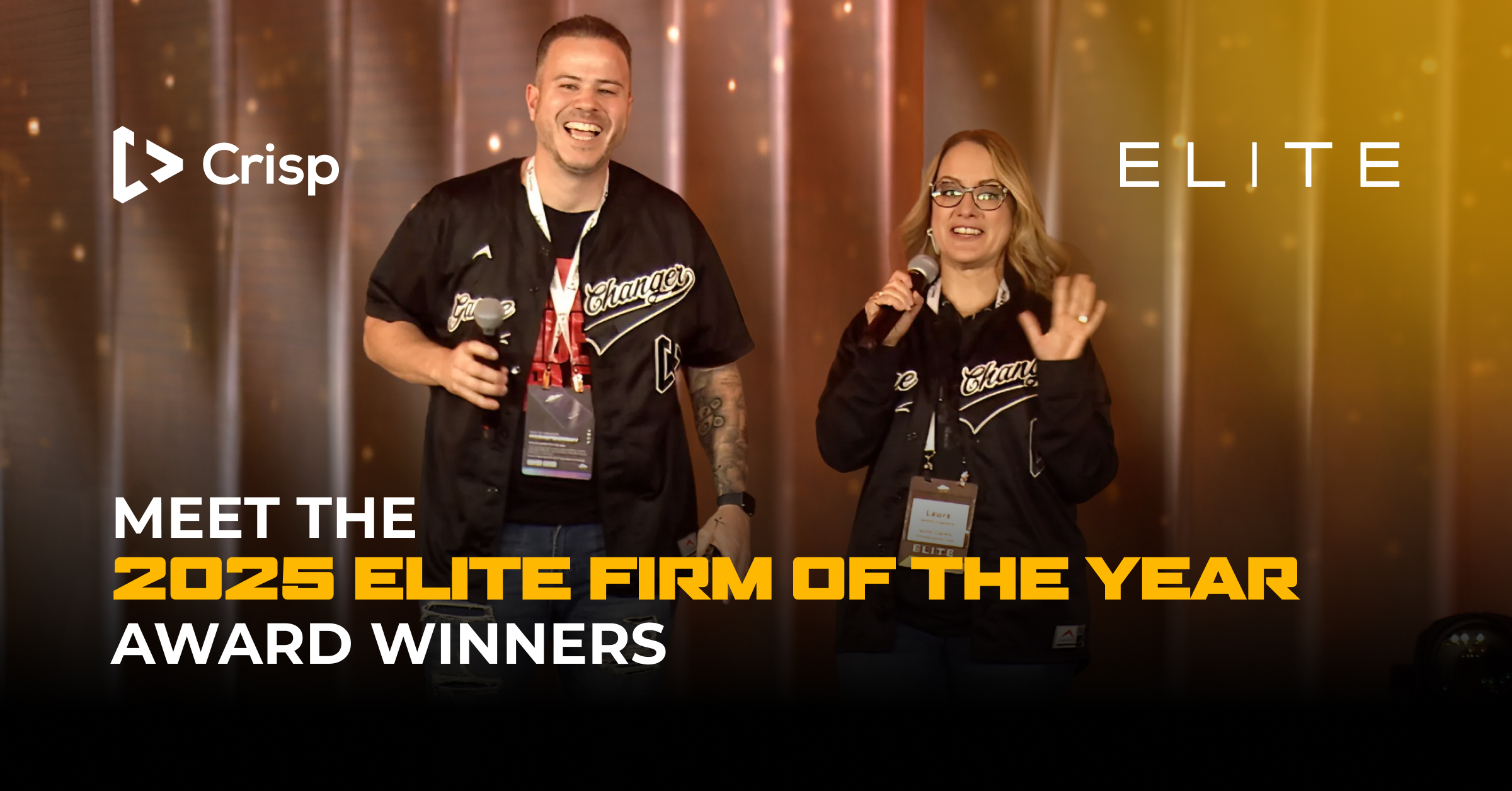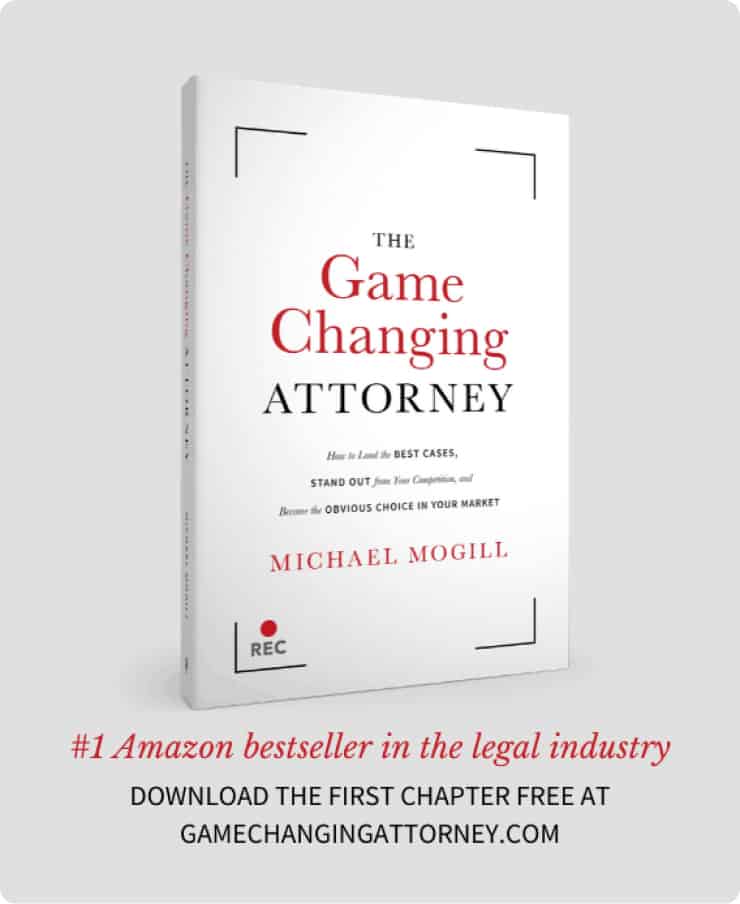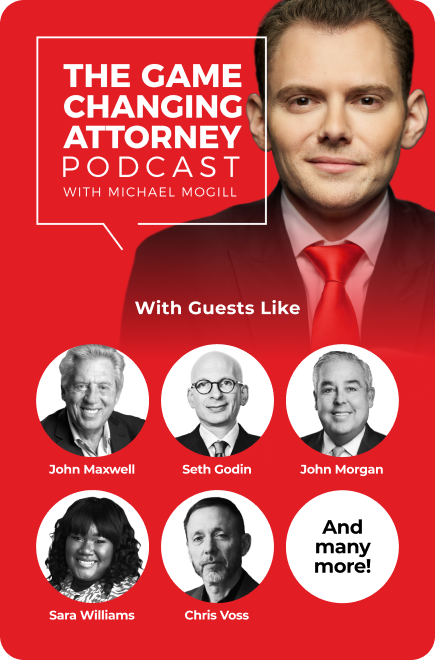The 2025 Game Changers Summit has become known as a large-scale celebration of the accomplishments of the nation’s top law firm owners.
For the third consecutive year, Michael and Jessica Mogill took the stage throughout the two-day Summit to recognize the most committed Crisp Coach members for their incredible transformations and contributions this year.
Winners of these carefully vetted, highly prestigious Crisp Game Changer Awards at each level (ELITE, PREMIER, SELECT, and CrispX) were determined based on the factors that impact a successful business, an influential leader, and a true Firm of the Year: Visionary Leadership, Client Experience, Community Impact, and Firm Culture.
While there were many worthy firms that applied, one firm stood out and truly earned the title of ELITE Firm of the Year: Laura dePaz Cabrera and Waldemar Cabrera of dePaz Cabrera Immigration Law!
Meet Laura dePaz Cabrera and Waldemar Cabrera
Laura dePaz Cabrera never imagined herself as the owner of a law firm.
“I remember in law school, there was a gentleman who knew from day one he wanted to start his own law firm. I thought he was crazy,” she admits. “That, to me, was always very intimidating.”
Born and raised in Gainesville, Florida, Laura grew up in a large Puerto Rican family and spent her formative years working at her aunt’s restaurant, learning the value of hard work and community. Her rich bicultural background, spending summers in Puerto Rico, and her fluency in Spanish and English all gave her a deep appreciation for immigrant experiences.
After graduating cum laude from the University of Florida in 2003 with a major in Political Science and a minor in Latin American Studies, Laura lived and worked in Paris, France, before returning to pursue her legal education. She earned her Juris Doctor from the University of Florida Levin College of Law in December 2007 and was admitted to the Florida Bar in February 2009.
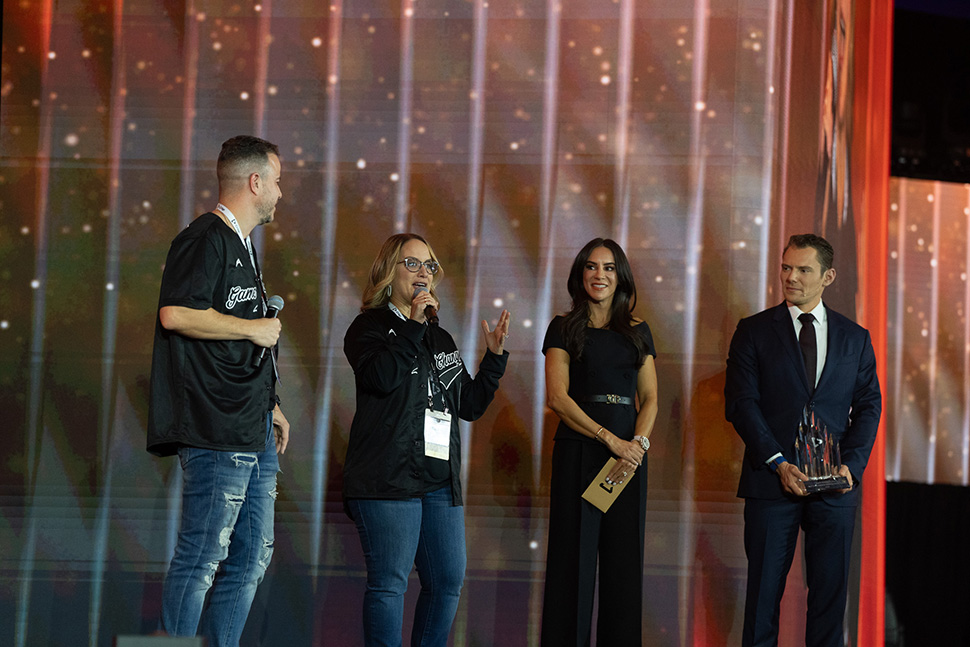
From there, Laura pursued a traditional legal career track. She worked hard for a law firm, made partner, and was content with that trajectory. But everything changed when she got the chance to take the reins at an immigration law practice.
“The opportunity to practice immigration law and eventually take over an existing law firm was kind of thrust upon me,” Laura explains. “Immigration law had always interested me, being from a very large Latino family in Gainesville, Florida, and being one of a few Spanish-speaking, bicultural lawyers.”
It was her husband, Waldemar, who pushed her to take the leap.
“I’m more of a change-is-an-opportunity kind of person,” Waldemar says. “I kept telling her, ‘What if you don’t take this opportunity, and then later, are you going to be okay with that decision?’”
His words resonated deeply with Laura and prompted her to act.
“One of those what-ifs where we go through a million what-ifs in life,” Laura said. “This what-if would have haunted me if I hadn’t at least tried.”
So she dove in headfirst and partnered up with a solo practitioner who had run the firm for a decade. But Laura suddenly found herself having to learn an entire area of law and learn to run a fully operating business all at once. Just six weeks later, her law partner moved out of the city, and she was forced to fly solo.

“My former partner — and he’ll be the first to say this — is brilliant, but he is not at all organized,” Laura explains. “Organization is my bedrock, my foundation. So there were a lot of challenging moments, figuring out the business aspect of it, the legal aspect of it.”
The phones never stopped ringing, which was wonderful. But from an operational perspective, it meant that building intentional systems and workflows took far longer.
“I had to hit the ground running,” Laura says. “I was doing consultations and trying to put systems in place on the back end. It never stopped.”
That was eight years ago. And as Waldemar notes with a smile, “We have come a very long way.”
dePaz Cabrera Immigration Law: From Floundering to Operational Success
Laura and Waldemar rolled out countless Crisp Coach concepts and tactics throughout their ELITE membership, transforming every area of their practice and earning them ELITE Firm of the Year.
Let’s explore the journey that brought them here and what they’ve implemented.
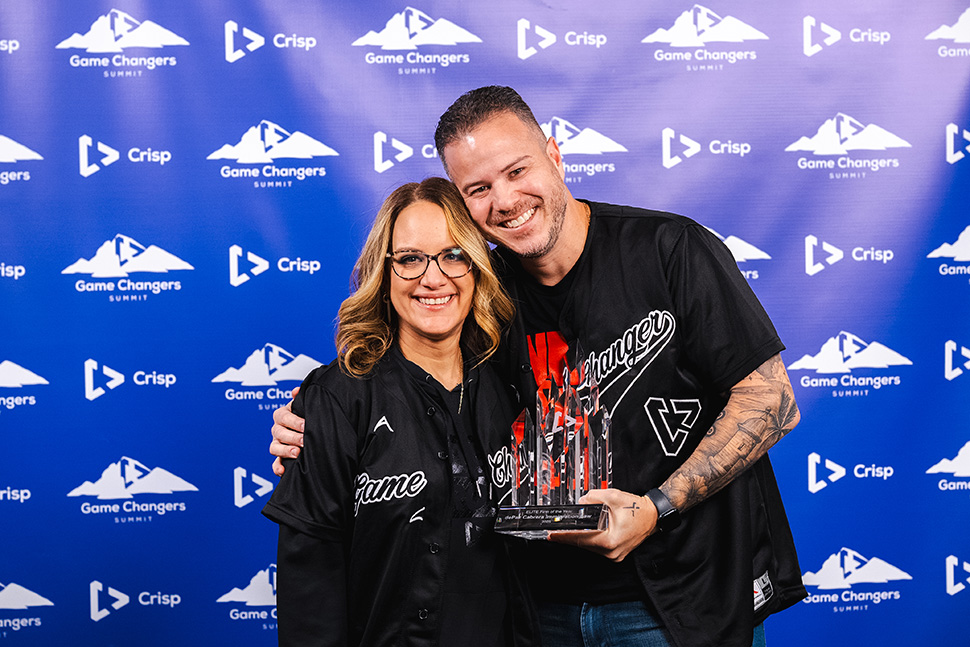
Excellence in Client Experience
Before discovering Crisp, the firm’s client experience was functional but inconsistent. Laura remembers one moment in particular that crystallized the problem for her.
“I’ll never forget one time a client came in. This is very early on; my former partner had just left. I was by myself, and the client asked how much was left on his bill,” Laura recalls. “I remember hearing from my office. I’m like, ‘Oh, you’ll be out of here in five minutes.’ And I went back to what I was doing, and about 15 minutes later, I come out and he’s still there.”
The staff was scrambling, trying to piece together information from Post-it notes, copies of receipts, and handwritten notes on contracts.
“That was the moment where I was like, ‘Okay, this is not going to work for me,’” Laura says.
Since those humble beginnings, Laura and the team have completely transformed the firm’s operations. Anyone in the firm can instantly access the balance on any case at any given time, what payments have been made, when they were made, and the method of payment.
More importantly, the client experience has evolved from purely transactional to deeply relational. The breakthrough came in fall 2023 when dePaz Cabrera Immigration Law hosted a Crisp Coach Client Experience Optimization Onsite Training.
“I remember being a little apprehensive going into that training because it requires your whole team,” Laura admits. “At the time, we had an employee who was great but had little toxic vibes sometimes, and I didn’t know how much she was going to participate.”
That apprehension proved unfounded.
“It was a transformative event,” Laura says. “We still have the notepad that all the notes were taken on in our break room, and we’ll change it to a different page every few weeks just to have that material front of mind.”
“We were really able to identify, and not just me — this was my favorite part — most of the recommendations that came through I would have never thought of. It was the team,” Laura continues.
“The team [was] trying to find out, ‘Where are the disconnects? Where are we finding roadblocks? Where could our clients be experiencing unnecessary frustration? Or where are there opportunities that we can enhance this client experience that we’re not currently doing?’”
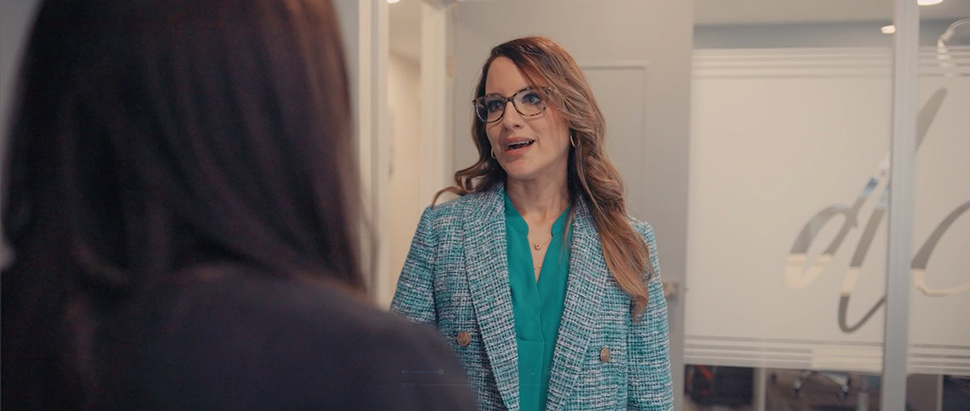
Dedicated Onboarding Process
One of the most impactful changes at dePaz Cabrera Immigration Law was the mandatory onboarding process, where every client meets face-to-face with their dedicated case manager.
“That visual connection,” Waldemar emphasizes. “We wanted that connection. They see their case manager face-to-face so that they can put a face to a name, and anytime they have a question, anytime they have a concern, they talk to that person.”
Previously, cases were siloed by different stages, with clients talking to different people throughout their journey. This created a disconnection between the client and the firm.
“We transitioned that to try to have one point of contact that the person could form a connection with, that our clients could trust,” Laura explains.
The result is a team of case managers who are deeply connected to their clients and their lives. They know when a client has a baby, the client’s country of origin, who got a traffic ticket that they’re still worried about, and more. With that personal connection, case managers can effectively reassure them and build trust.
Systematic Touchpoints
The firm also implemented workflows with scheduled touchpoints for all cases to keep momentum moving forward.
“Before, a client could hire us to do X, and a year later, we still hadn’t done X,” Laura explains. “Not because we didn’t want to do X, but because the client was taking their time. We now have built-in workflows and touchpoints to get those cases moving because even though in all of the situations it was their delay, when the client looks a year down the line and has paid money and hasn’t gotten that benefit, we’re going to be the ones to blame.”
The Human Impact Initiative
The highest-impact upgrade to the firm’s client experience is the push to look beyond the case details and connect with immigrant clients on a basic, human level.
“We deal in a human-centered field of law,” Laura explains. “Immigration law — it’s human impact. We’re talking families. We’re talking individuals. We’re talking about where you’re going to put your roots and where your family is going to thrive. There are so many human touchpoints with what we do.”
The firm challenged its team to look beyond just the tangible benefit of whatever immigration goal clients are trying to achieve and instead focus on the human lives they’re impacting.
“We created an initiative where team members are encouraged to look for things going on in our clients’ lives,” Laura says. “Did you have a baby? Did you get married? Did you go through surgery? New car? New job? Did you lose a loved one? Did you graduate? Did your child graduate from high school?”
When team members identify these life events, the firm sends personalized gifts.
“The feedback from our clients for a $30 to $50 gift has been tremendous,” Laura shares. “Not only for us as a leadership team, but for the staff to see these reactions.”
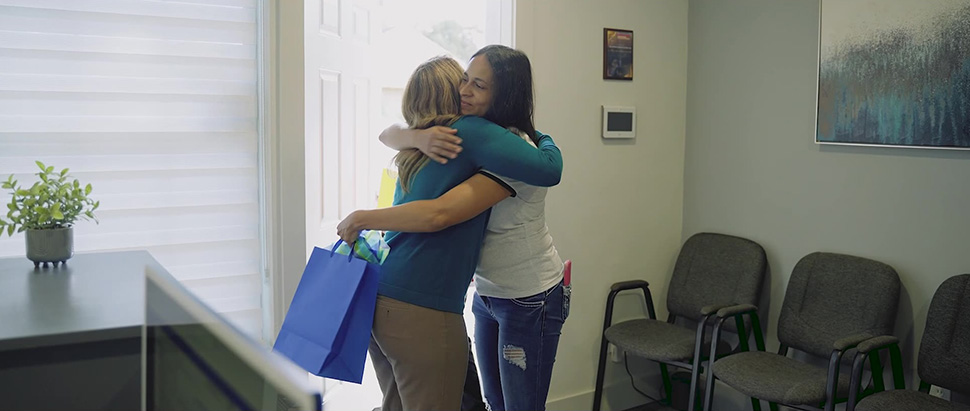
One team member, typically introverted and quiet, lit up when the initiative was announced at an all-hands meeting.
“She was like, ‘This is awesome. This is so exciting,” Laura recalls. “And she showed genuine emotion, just having that human impact.”
The goal is simple but profound: “When that client looks at that Green Card that they eventually have, our hope is that it’s more than just a piece of plastic that gives you lawful status in this country, that the feelings that it’s going to evoke are more than just this. It’s going to be feelings of happiness, of support, of knowing that you had a team behind you, and that fills their heart with joy for a time period which can be very scary for most of our clients.”
The transformation from the old client experience to the new one has been nothing short of remarkable.
“Our client experience was always good in the sense that we were always achieving incredible, transformative results for our clients,” Laura reflects. “But it’s night and day in terms of the journey that our clients go through with us in the processing of their case.”
Visionary Leadership at dePaz Cabrera Immigration Law
Laura has always been a natural leader. Like most lawyers, she gravitated toward leadership throughout her life, whether it was as class president, heading up team projects, or volunteering to run a show.
“When I was younger, I was called ‘bossy,’” Laura says with a smile. “But now we’re not bossy anymore with some leadership skills, and I like that change of terminology.”
However, owning a law firm requires an entirely different set of skills than traditional legal leadership roles.
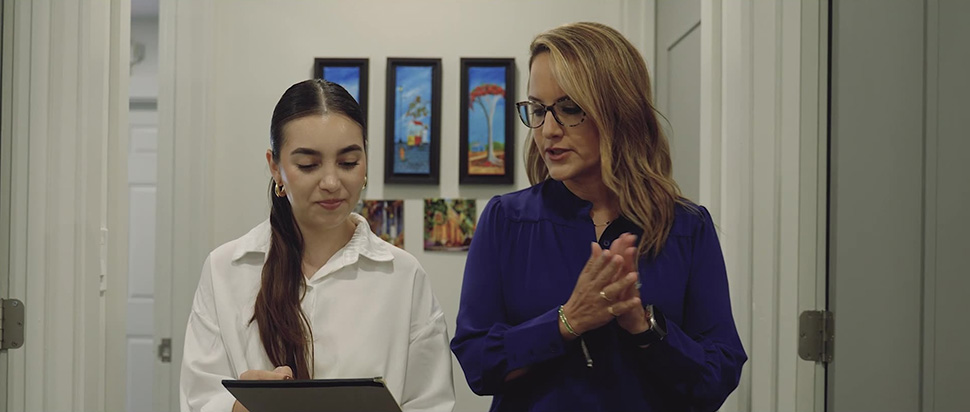
“Real life isn’t like high school group projects,” Laura explains. “My evolution is recognizing that you can’t let Johnny and Jenny just jump on the trampoline, especially when they are your team players who are being paid for a job and have certain expectations.”
“With every passing day, my time becomes less and less available,” she continues. “Because of that, it is imperative to have a strong team — and to have a strong team, you have to lead that team.”
The Power of Vulnerability
One of the most significant evolutions in Laura’s leadership has been learning to show vulnerability. She always felt pressure to project an image of complete control.
“I’ve always, for the longest time, thought I need to have this outward appearance of, ‘I’ve got this. I know what I’m doing. I am the professional, stoic face. Trust me. I’m a badass,’” Laura shared.
But she’s learned that true leadership requires something more.
“Leadership and even law firm life are not always going to be rosy,” Laura says. “You’re going to have difficult moments. You’re going to have loss. You’re going to have setbacks. And I’ve learned that there are moments where you must show vulnerability. You must show your team that this is impacting you as well, because it’s impacting them.”
Working Together as Partners
Laura and Waldemar intentionally let their team witness them working through disagreements about office procedures and firm decisions.
“We’re both invested in its success, and we’ve done that intentionally,” Laura explains. “We will let the staff watch us kind of go back and forth on something. Not every disagreement; sometimes we do have behind-closed-doors conversations. I think it’s not healthy to have your team witness all of the inner workings of your leadership team.
“But we have intentionally selected several times for them to not only watch us duke it out in words in a nonviolent way, but just kind of go back and forth on our points, but also to get their perspective too,” she continues. “We want to show our team we don’t have it all figured out. We are figuring out things as they’re presented to us. The focus is always what’s going to be best for the firm, what’s going to be best for our clients.”
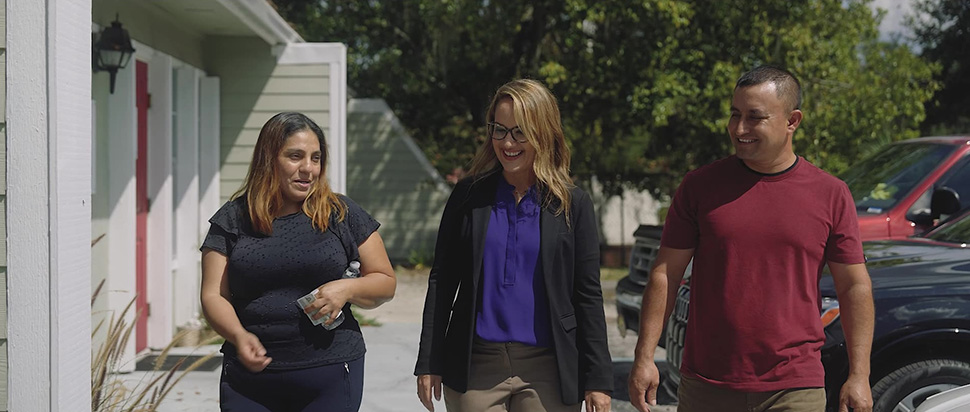
She draws a parallel to parenting.
“With our kids, we try; we don’t fight very often, but we do have disagreements. And for us, it’s really important that our kids see us have those disagreements in a very respectful way, but also see the resolution. Because in life, there’s going to be conflict. Same with leadership. There are tough moments.”
Demanding Excellence
Another evolution in Laura’s leadership: She’s learned to have difficult conversations and hold her team to high standards.
“My holding my employees to the standard of being the best version of themselves that they can be is not me asking for too much,” Laura says. “It’s not me being domineering or being an unreasonable leader. It’s me demanding that they bring their best self 100% to what we do here at the firm, and I’m not doing them any favors by letting them bring less than that.”
Last year, Laura had to implement a performance improvement plan for the first time.
“That was a hard conversation, and I prepared for it, and I practiced it,” she recalls. “It went much better than I thought it would. None of this was a surprise to her. She knew and understood exactly where it was coming from.”
The shift initially came from a Crisp Coaching session when Laura was dealing with significant personnel issues.
“I remember I texted my coach and I’m like, I need help ASAP. This just happened, and I’m sitting here in my car fuming,” Laura recalls. “That’s where a lot of the ‘Okay, what are the issues? Let’s identify what the non-negotiables are and what we can do about it.’”
With her coach’s guidance, Laura crafted a detailed PIP using AI to help determine benchmarks, timeframes, and expectations.
“Could I have figured that out on the internet or something? Maybe,” Laura says. “It wouldn’t have been as polished and nice, and I probably would have delayed a lot longer.”
As Waldemar notes, “Can we do what we do without Crisp? I think we’re smart enough, and I say that in a humble way. But it would have taken us so much longer to be where we are today.”
A phrase from Jessica Mogill at Crisp has become a mantra at the firm: “You endorse what you tolerate.”
“I can’t even explain how transformative in my brain chemistry it was to hear that,” Laura says. “Because it’s 100% true. Me closing my eyes and hoping that something improves on its own — that is my job as a leader to drive that improvement. It’s my responsibility to be accountable and to hold that person accountable.”
Firm Culture at dePaz Cabrera Immigration Law
Building an intentional firm culture has been a priority for Laura and Waldemar over the past year as well.
“Leadership is about not only leading your team by example and being the face and being the front, but understanding and communicating to your team how valuable they are to what you do,” Laura explains.
After working as support staff at law firms during undergrad and law school, Laura has deep appreciation for those positions. But she’s learned that appreciation alone isn’t enough.
“It’s not just about, ‘Here’s your paycheck. You’re doing great. Pat on the back,’” Laura says. “You really must articulate to your team constantly how important they are. Recognize when things are being done right. Don’t just act when things go wrong. And really make it so that coming to work and feeling part of the team is intentional.”
The firm now holds monthly all-hands meetings where Waldemar, whose background is in sales and relationship building, leads icebreaker activities and get-to-know-you moments.
“Sales 101 is to build a relationship,” Waldemar explains, “and that has always been my way. But not only that. I want to build a relationship with my teammates because that’s who I spend most of my time with. It’s funny how asking a few questions changes the whole dynamic of the team just because now I know a little bit more about them.”
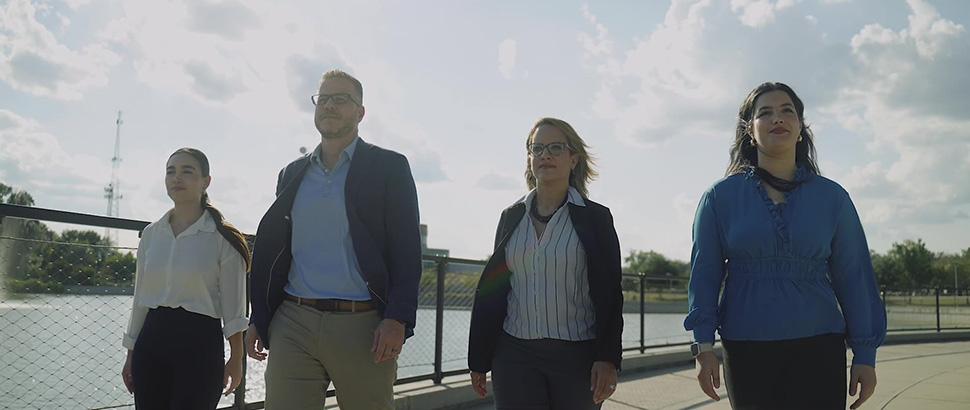
At a recent one-year anniversary celebration lunch, Waldemar asked one of their team members about her challenges and favorite parts of the past year.
“The favorite part was when she said that she connects with clients,” Waldemar recalls. “I was the one who hired her, and when I heard that from her, I felt touched. I knew that from her, but I didn’t know that it was going to actually happen. And when everyone else also heard it, I could see everyone else’s faces. I’m glad that I feel the same way she does, because a lot of people were nodding.”
Communication as Foundation
Both Laura and Waldemar emphasize the importance of clear communication.
“Don’t ever assume that people know,” Waldemar stresses. “If you don’t tell me what I’m doing wrong or what I’m doing right, I’m going to continue to do what I’ve been doing. And if it’s bothering you, then it’s going to continue to bother you.”
This philosophy extends to their personal relationship as well, which allows them to successfully work as life and business partners.
“It’s not something that a lot of people can do,” he adds. “Luckily, we can. And I still like her.”
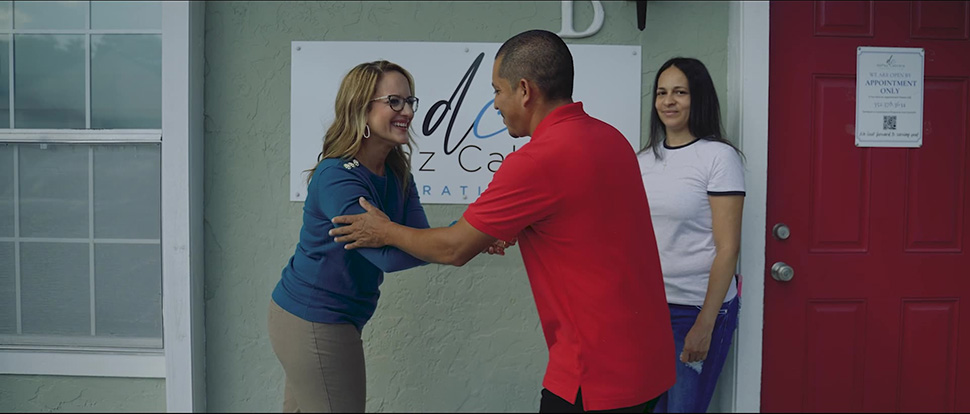
Community Impact at dePaz Cabrera Immigration Law
Laura’s commitment to her community runs deep and extends far beyond her law practice.
As a lifelong resident of Gainesville, Florida, Laura has actively contributed to her community in numerous ways:
- Served as President of the Junior League of Gainesville
- Served as President of The James C. Adkins, Jr. Inn of Court
- Serves on the Board of Directors for the American Immigration Lawyers Association (AILA) Central Florida Chapter, where she has held the position of Executive Vice Chair since 2021
- Hosts “Adelante Inmigrante,” a Spanish-language video podcast offering valuable insights and guidance to the immigrant community
Multiple organizations have also recognized Laura for her professional excellence, including being named to the Florida Rising Stars list by Thomson Reuters from 2013-2023, a peer designation only awarded to a select number of accomplished attorneys in each state.
Beyond her professional commitments, Laura showcases her artistic talent as the lead female vocalist for Tropix, a Latin-fusion band based in Gainesville, bringing music and joy to her community.
“A lifelong resident of North Central Florida, she is focused on enriching our community, one immigrant at a time,” as her firm’s website states — a mission that drives everything she does.
Final Thoughts
Laura’s journey with Crisp began in June 2023 when she received an email that resonated deeply with her current struggles of never having the time to actually build her business.
“Every bullet point, I was like, yes, I do, yes, yes, yes, yes,” she remembers.
The email was an invitation to Million Dollar Day, which Laura attended in August 2023.
“I walked out to the backyard area to call [Waldemar], and I’m like, ‘I bought the timeshare. I signed up for the coaching program. I’m sorry,'” Laura laughs.
Waldemar’s response was characteristically optimistic.
“First of all, yes, I told you not to buy the timeshare, but let’s see what we can do positively with this. What can we gather from them?”
That night, lying on her daughter’s twin mattress at 1:00 AM, Laura stared at the ceiling as the euphoria wore off, thinking, “What have I just done?”
Today, that doubt has been replaced with certainty.
“Not only would it have taken us longer — the accountability, the resources, the ability to talk to our coach to see how we can handle things — it would have been so many more stumbling blocks,” Waldemar said.
The transformation has been comprehensive. When a senior case manager with almost four years of experience left the firm, Laura and Waldemar braced for impact.
“I remember telling Laura that we’re going to stay with a pretty green team. No one has been there for longer than six or seven months, and we’re going to have probably a moment of, ‘Whoa, we’re in trouble now,'” Waldemar recalls. “We’re still waiting for that moment because it just never happened.”
“Her departure — we didn’t feel the impact the way we thought we would,” Laura adds, “and I think that’s 1,000% due to what came out of that Client Experience Optimization [Crisp Onsite Training] and the workflows and the systems that we put in place. What we really did was internally make it so that there are no gaps. There’s just continuity. There’s an expectation. There’s a standard that we can then continue to build upon.”
The journey hasn’t always been easy. There were early moments where Laura felt stuck, driving home in complete silence — no radio, no podcast, no NPR, just her and her thoughts of despair and doom. But those dark drives home are a distant memory now.
Today, Laura and Waldemar lead a firm that not only achieves transformative legal results for clients but also creates a journey filled with support, humanity, and genuine care. They’ve built operational systems that create consistency and excellence. They’ve cultivated a team culture where people feel valued and connected. They’ve learned to lead with both strength and vulnerability.
Most importantly, they’re fulfilling Laura’s mission of enriching their community, helping one immigrant at a time.
As Laura notes about the practice of immigration law: “It’s the most important thing that will ever happen in their lives.”
